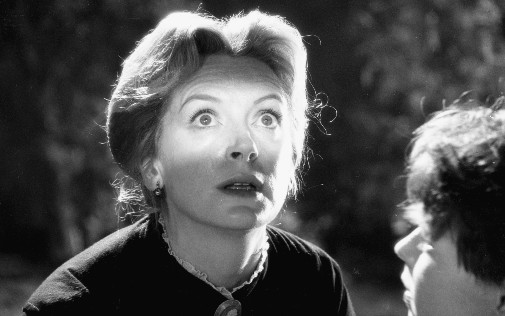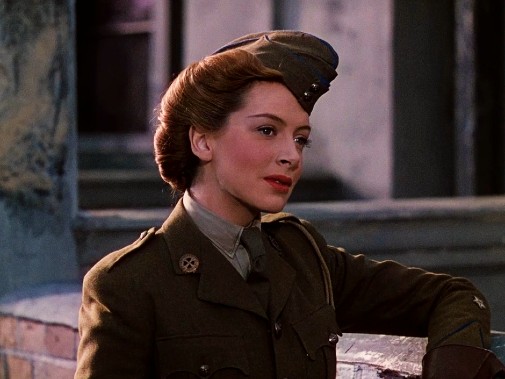
For decades she held the record of being the most Oscar-nominated actress never to have won the statuette, with six unsuccessful nominations. In a piteous gesture, the Academy granted her an honorary award in 1994. How fitting that Deborah Kerr received such tribute from the hands of Glenn Close, the current holder of the older actress' erstwhile record. Considering this trivia, it'd be easy to remember Kerr's legacy through the prism of Oscar history. That would be a mistake. I state it as someone who first encountered the British thespian through her nominated roles, constructing a mental image limited by AMPAS' taste. As it turns out, despite her numerous nods, the most outstanding Kerr performances weren't so highly celebrated by the Academy. Simply told, that Oscar-y sextet doesn't do her justice.
To celebrate Deborah Kerr's centennial, let's remember her range beyond golden laurels, her incandescent talent, the power she brought to her films. Let's honor her by reflecting on the actress' greatest work - the nightmare that is The Innocents…
 THE LIFE AND DEATH OF COLONEL BLIMP (1943)
THE LIFE AND DEATH OF COLONEL BLIMP (1943)
Trained in classical ballet and stage acting, Deborah Kerr was touted as a movie star before her films ever made it to the screen. While she shot scenes for Powell and Pressburger's Contraband, they got deleted, making 1941's Major Barbara her debut. In that George Bernard Shaw adaptation, Kerr starred alongside Wendy Hiller, stealing the spotlight even in a small supporting role. That same year, she'd take over a part Hiller had originated on stage when she played a miner's daughter in Love on the Dole. Despite a dodgy accent and ungenerous comparisons to her predecessor, Kerr wowed audiences and critics alike. By the mid-40s, she was a sensation in Britain. Hollywood soon took notice.
It was with Powell and Pressburger that Kerr found her best early roles and films, among them The Life and Death of Colonel Blimp, where she plays three different women. Seeing such range, the Technicolor beauty of her read-headed splendor, and growing popularity at home, MGM decided to pursue Kerr. 1947 saw the release of her last Powell and Pressburger masterpiece, Black Narcissus, and her first American movies, The Hucksters and If Winter Comes. Unfortunately, the latter disappointed in comparison to the British psychosexual drama, marking a lackluster beginning for Kerr's stateside career.
Indeed, constricted by a lady-like image that MGM actively cultivated with the press, Deborah Kerr found herself trapped in a star persona she didn't want. Sexless and terminally classy, her roles were limiting her craft, resulting in a series of performances that never reached the glory of her luminous British projects. Still, one can't say she wasn't successful. 1949's Edward, My Son resulted in a Best Actress Oscar nomination, after all, and many of her movies were box-office hits. Nevertheless, it took a break from MGM for Kerr to find her footing as a Hollywood-based acting powerhouse. Columbia's From Here to Eternity was the turning point.
 FROM HERE TO ETERNITY (1953)
FROM HERE TO ETERNITY (1953)
The role of Karen Holmes, an army wife who cheats on her husband with Burt Lancaster's hunky Sgt. Warden, proved to be an against-type triumph that showed Kerr could convince as more than a demure English rose. It also helped consolidate a model that would follow the actress to the end of her career. Henceforth, many of her best roles reflected a dichotomy between desire and repression, often bubbling with erotic yearnings that can never be fully realized due to oppressive forces. Even something as family-friendly as The King and I gave Kerr opportunities to suggest a carnality. Look at her chemistry with Brynner during the "Shall We Dance?" number if you need convincing.
And yet, the Academy kept rewarding her least daring works. While they did honor her turn in 1953's From Here to Eternity, 1956 saw a nomination for The King and I instead of the sexually charged Tea and Sympathy. In 1957, her passionate longing in An Affair to Remember got short thrift compared to the nun part in Heaven Knows, Mr. Alison. As for 1958, Kerr got nominated for one of her worst performances in Separate Tables while the devastating tragedy of Bonjour Tristesse was overlooked. At least her last nod, for 1960's The Sundowners, showcases a deviation from primness and arch mannerism in favor of a more realistic Australian Outback milieu.

Again, one despairs at AMPAS' middling decisions, how their selection obscures what makes Kerr an actress for the ages. Indeed, perhaps her most fabulous creation came in a genre the Academy seldom acknowledges – horror. Jack Clayton's The Innocents is a version of Henry James' ghost story The Turn of the Screw, taking cues from the original novellas and William Archibald's 1950 play adaptation. Truman Capote was one of the screenwriters, and he sussed out the psychological ambiguity of the earlier texts, finding new perversities in euphemism, evoking paralyzing fear through the possibility of madness.
That being said, The Innocents' most significant divergences from James' prose aren't so much a product of Capote's writing as they are a consequence of Kerr's casting. The 1898 novella doesn't specify much about its nameless protagonist, the new governess to the children of Bly manor. Nonetheless, there is the suggestion of her youth. Much of how one interprets the woman's paranoia comes from the awareness of her naivete, a fragile innocence more understandable in girlhood than in middle-age. At 39-years-old, Deborah Kerr was long past her virginal ingénue roles when she took on the part of the now-named Miss Giddens.

The casting isn't unprecedented in dramatizations of The Turn of the Screw. Beatrice Straight was in her 30s when she originated the role in Archibald's play, and Ingrid Bergman played a version of the character for a 1958 TV production. However, the image of Kerr in midcentury Victorian garb brings forward a multiplicity of ideas that transform the text. Furthermore, one must contend with the actress' evolving persona, once a paragon of proper Britishness who later tried to reimagine herself as the shattered vision of repressed sexuality given human form. The governess of the novella is starting to confront the corroding powers of 19th-century social mores. The one in the film has long been defeated by those same powers.
It's the difference between a ripe fruit sitting on the branch and a specimen fallen to the ground and irreparably bruised. Apologies for ageism, not to mention the sexism, but such readings spring forth from the period setting and its fractious relationship with Kerr's presence. In the society hinted at by the set design, lavish costumes, and dialogue, this Miss Giddens would be a spinster, looked down upon as one condemned to be perennially unmarried, childless, frigid, unfulfilled by the standards of antiquated gender norms. Her role as substitute mother to her parentless wards, even her dynamic with their uncaring uncle, is subtly twisted out of its usual shape, given a sharper edge than it might otherwise have had.

These details make James' nebulous protagonist a very concrete entity, one solid center for this storm of psychological horror. The Expressionism that Clayton's direction and Freddie Francis' cinematography conjure is built upon the foundations of a character study that Kerr delineates with shattering precision. It's as if she weaponizes the poised priggishness of her past MGM ladies when playing this pastor's daughter. The thespian deconstructs those past roles very being and exposes the neurosis that lay within, dormant, barely hidden. The Victorian mannerism is ever-present, but Kerr performs it as an unnatural social prison, a theatrical straight-jacket with which she bristles against it as the panic sets in and takes over.
The contrast between a rigid pose and wild eyes works in an almost elemental manner. The aesthetic disruptiveness of these combined motions defines the picture as an expression of marrow-deep distress. In other words, the relationship that Kerr's face has with her body is, in itself, an element of horror. It signals that something ineffable is very wrong, whether with Miss Giddens or the children or both. As the governess becomes sure that the ghosts of her predecessor and that late woman's violent lover possess the kids, panic evolves into mania. The illicit sex in the hauntings' backstory also spikes her interest. For one sickening instant, the spectator almost feels that Miss Giddens is titillated by the dead's transgressions, by her prepubescent pupils' wicked knowingness.

Rather than providing a definite answer to the question of whether the ghosts are real or just a product of Giddens' repressed psyche, Kerr offers a take on the character that's both unsettling and ambiguous to the end. It doesn't matter if the specters are the dead returned or trivial hallucinations. The governess has been driven to obsessive madness one way or the other. As The Innocents' final act manifests, sanity has slipped through her fingers, and Kerr seamlessly transitions from wide-eyed terror into a bug-eyed monstrosity. In her unraveling, the protagonist becomes the most frightening thing on screen, a more palpable terror than any phantasmagoria from the beyond.
Harnessing the power of suggestion so present in James' text and attuning herself to Clayton's formalistic conception of movie fear, Deborah Kerr delivers one of the most excellent performances in the history of horror cinema. It's an eerie tour de force and the crowning achievement of this actress' long career. As far as I'm concerned, Deborah Kerr was never better. What about you? What's your favorite performance in her filmography?

The Innocents is streaming on Fubo, DirecTV, the Criterion Channel, and Spectrum On Demand. Criterion also has a vast collection of other Kerr titles in celebration of the actress' centennial.